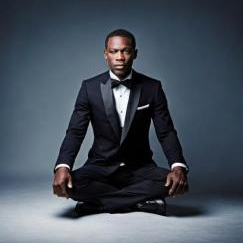“Discipline Is Destiny” is a comprehensive guide that explores the power of self-discipline in transforming lives. Through lessons inspired by historical figures, ancient wisdom, and modern examples, this book emphasizes the importance of physical, mental, and spiritual discipline in achieving greatness and living a fulfilled life.
Lesson 1: The Simplest Path To Discipline Is By Taking Control Of Your Body, And There Are Numerous Small Actions You Can Take To Achieve This.
Discipline is a crucial skill which can be developed if approached with patience and perseverance. According to the acclaimed author Ryan Holiday, building discipline can be most easily initiated by starting with small, physical challenges. The rationale behind this is that when you undertake a physical activity, you can sense your body’s responses to those challenges. The benefits of being disciplined become apparent immediately, especially when you wake up feeling more rested after a sound sleep or the day after a workout. Holiday has listed many activities to show that discipline is not restricted to any one category and includes everything from eating lean to taking cold showers. However, the most important aspect of building discipline is showing up every day since doing a little every day has a far greater impact than doing a lot on rare occasions. To make his point, Holiday cites the example of legendary baseball player Lou Gehrig, who played over 2,000 games without missing a single one, even when he did not feel well. In the long run, this consistent show of discipline made all the difference and helped him achieve greatness.

Lesson 2: Cultivating Happiness Requires Practicing Self-Restraint And Continuously Working To Maintain Mental Moderation Throughout Our Lives.
The modern world is replete with instant gratification opportunities. Alas, giving in to such impulses often leaves us feeling empty and unfulfilled. Pursuing every desire as soon as it arises could lead to health problems, career stagnation, and an overall sense of meaninglessness. Therefore, it is essential to learn how to exercise restraint in order to fully relish life’s pleasures. Indeed, moderating our minds is a lifelong endeavor. The Buddha’s experience is a lesson in this regard. Despite being born in a palace, he struggled with misery. Even poverty didn’t provide him with any solace. It was only after he mastered the practice of patience, withstanding suffering, and gracefully navigating life’s vicissitudes that he was able to find genuine enjoyment in life.
Lesson 3: Discipline Is Meaningful Only When It Serves The Greater Good, So Prioritize Acts Of Kindness And Compassion Towards Yourself And Others
Based on the teachings of ancient philosopher Ryan Holiday, the highest level of discipline occurs on a spiritual plane, where individuals use self-discipline for a greater purpose and consider failure as part of the process. In the case of ancient Roman charioteers, they used self-discipline to perform life-or-death stunts for the entertainment of their community. Spiritual discipline entails staying calm, doing the work, and steering the course without alienating others. Even when faced with challenges or misunderstandings from others, it’s crucial to remain respectful and diplomatic. As Stoic philosopher Cleanthes once observed, negative self-talk and beating oneself up for mistakes isn’t productive, and it’s vital to approach obstacles with a level head.
The Stoic philosopher Cleanthes once encountered a man in Athens who was heard yelling at himself for some mistake. Cleanthes approached him and kindly reminded him that he was not talking to a bad man. This anecdote serves as a reminder that while in pursuit of discipline and showing kindness to others, we should extend the same courtesy to ourselves whenever needed. This implies that practicing self-compassion is a key component of stoic philosophy. By treating ourselves with kindness and understanding, we can navigate life’s challenges with greater resilience and fortitude. Ultimately, this practice of self-kindness can lead to an overall sense of well-being, and contribute to both personal and societal growth.
Lesson 4: Perfectionism Is A Flaw
In 1931, Martha Graham, a renowned dancer and choreographer, found herself trapped in perfectionism while working on her dance series called Ceremonials. Despite the praise from her dancers, she could only see its imperfections and felt unable to meet her own high expectations. This perfectionism is a common struggle among great individuals in various fields, hindering their ability to enjoy their achievements and move on to new projects. Examples include Leonardo da Vinci, Steve Jobs, and Ralph Ellison, who all faced challenges due to their relentless pursuit of perfection. Perfectionism can lead to paralysis and prevent the completion and release of creative works. It is crucial to recognize this tendency and have the discipline to overcome it, to embrace imperfection and ship our work. Having trusted advisors and partners who can provide balance and help us move forward is essential in managing perfectionism and achieving greatness.
Lesson 5: Be Lenient Towards Others, But Hold Yourself To High Standards
Cato the Younger exemplified strict self-discipline, while recognizing the need for tolerance towards others. Holding himself to the highest standards, he remained humble and forgiving, understanding that not everyone could match his level of commitment. Similarly, we should be strict with ourselves but tolerant with others, recognizing that their choices and actions are beyond our control. Instead of criticizing or pushing them to conform, we should focus on being an inspiring example and showing empathy. It is important to understand that discipline is a personal journey, and while we strive for excellence, we should also practice compassion and acceptance towards others. By embracing both self-discipline and understanding, we can create a harmonious balance in our interactions and personal growth.
Lesson 6: To Attain Greatness, It Is Essential To Harmonize Your Body, Mind, And Spirit
According to ancient wisdom, achieving greatness requires aligning the body, mind, and spirit. The analogy of charioteers exemplifies the essence of temperance, as they skillfully manage various aspects simultaneously. Antoninus Aurelius, a ruler known for his balance and equanimity, exemplifies the importance of harmony in personal and professional life. True self-discipline must be balanced with kindness, compassion, and love. It is a journey of self-actualization, not isolation, where understanding and acceptance of others become paramount. The story of Cleanthes reminds us to be forgiving and supportive of ourselves when we make mistakes. Stoicism emphasizes kindness and assistance, aiming to consider the interests of all people. Therefore, in our pursuit of greatness, we should befriend ourselves and use self-love to navigate challenges and fulfill our destiny.
Lesson 7: Cultivate Your Physical Self-Discipline As A Foundation To Cultivate Mental Fortitude
Developing self-discipline in your physical body is just the beginning; to truly achieve temperance, you must also cultivate discipline in your mind. While physical self-discipline is essential for overall well-being, it is not enough to lead a balanced life. Moderating your thoughts, emotions, and responses amidst the chaos of life is crucial. Queen Elizabeth serves as a remarkable example of maintaining composure in the face of adversity.
The key lies in that brief moment between stimulus and response. Rather than succumbing to destructive patterns of reaction, take the time to think, gather yourself, and consider the situation from a broader perspective. Patience and rationality should override fear, anger, and prejudice.
Training your mind also involves developing focus. Beethoven, for instance, would immerse himself in his thoughts, allowing himself to be consumed by his creative inspirations. Ignoring distractions and committing to your goals requires great self-control in a world filled with constant interruptions.
Perfection should not be the goal, as it can lead to paralysis. Instead, strive to do your best and embrace the opportunity to learn from failures. Remember that failure is not permanent, but rather an opportunity for growth. Believing in your capacity for improvement is crucial, as it sets the stage for personal development. Ultimately, everyone has the potential to improve, but it is your mindset and belief in growth that will determine your success.
Lesson 8: Self-Discipline Is Not A Form Of Deprivation; Rather, It Bestows Upon You The Gift Of Freedom
In today’s world of abundant freedom and instant gratification, many people find themselves unhappy despite having access to almost anything they desire. The missing ingredient is self-discipline, which President Eisenhower described as the key to true freedom. Without self-restraint, our lives become unbalanced and lacking in purpose. Self-discipline allows us to tame our lower self and strengthen our higher self, guiding us to live a life governed by principles, moderation, and determination.
Some may view self-discipline as self-deprivation, but in reality, it opens up a world of opportunities and prevents us from falling into the traps of excess and chaos. It helps us break free from the constant pursuit of more and enables us to enjoy what we already have. By exercising self-control, we tap into our true potential and avoid the pain and regret that come from not fully realizing it.
A powerful example of self-discipline is seen in the life of President Eisenhower. He understood the importance of having oneself under control, which influenced his military career and his successful tenure as the 34th US president. His restraint, persuasion, compromise, and patience were the sources of his power and accomplishments.
Cultivating self-discipline requires courage, but it leads to both personal success and greatness. In the following sections, we will delve into how to manifest self-discipline in our physical, mental, and spiritual aspects. Let’s begin with the body.
Lesson 9: Engage In Physically Demanding And Strenuous Activities
Physical fitness and self-improvement are essential for success. Engaging in physically challenging activities such as weightlifting, basketball, marathon, or long walks can improve one’s control and mental endurance. Success is not synonymous with comfort; it requires making yourself stronger by pushing yourself out of your comfort zone. Opting for difficult challenges instead of weak ones can be instrumental in achieving your goals. By training yourself to work hard and accepting a less comfortable lifestyle, you can become wealthier and more powerful. Let us challenge ourselves to break out of our comfort zones and push ourselves to new heights of achievement!
Lesson 10: Establish An Early Bedtime Routine
Research studies consistently show that getting enough sleep is crucial for one’s physical and mental health. However, it is not just about the quantity of sleep one gets, rather the quality of it matters just as much. Sleeping early has proven to be a beneficial habit in this regard. Not only does one get enough sleep, but the body also receives enough time to rest and rejuvenate itself. With proper rest, individuals are more likely to perform better, be more productive, and make sound decisions. Furthermore, early sleepers have enjoyed a host of benefits, including more time to engage in morning rituals such as meditation and exercise in a calm and peaceful environment. This routine, when followed regularly, can lead to success, just like the legendary Lou Gehrig, who followed this discipline for 17 years, reaping the rewards of improved physical health and mental acuity. Therefore, prioritize your sleep routine today to ensure that you are operating at optimal levels tomorrow.
Lesson 11: Simplify Everything
Many people possess intelligence and talent but struggle to find meaning in their lives. To overcome this challenge and lead a life full of purpose, it is essential to prioritize certain tasks and complete them with unwavering focus. Irrespective of feeling tired, busy or unmotivated, it is crucial to start in a small way and go for a 10-minute jog or write a single sentence about your book if you are writing one. By working consistently, one can complete tasks faster over time, and simple activities like the 10-minute jog or writing a sentence each day can gradually turn into half an hour of running or one page written. Rise to the occasion by consistently doing small activities every day to achieve complex goals and strive for greatness.
Lesson 12: Harmonize Your Body, Mind, And Spirit
In ancient times, charioteers and kings served as role models for mastering self-control. Charioteers had to navigate various challenges during races, requiring physical agility, mental focus, and emotional resilience. One such exemplar of self-discipline was Emperor Antoninus Aurelius, who ruled Rome with fairness and balance for 23 years. Self-discipline alone is not enough; it must be accompanied by kindness, compassion, and love. As you progress on your journey towards self-discipline, you will become more understanding and supportive of others. The story of Cleanthes highlights the importance of self-compassion and the ability to inspire oneself to do better.
Embrace self-discipline in your life by setting high standards, pushing your limits, and refusing to accept excuses. However, it’s crucial not to criticize or hate yourself when you make mistakes. Treat yourself as you would a friend, offering support and encouragement in times of difficulty. Remember that self-discipline is a lifelong process, and failure is an opportunity for growth.
Anyone can cultivate self-discipline by controlling their actions, thoughts, and emotions to align with their goals. It leads to increased productivity, happiness, and overall well-being. Even if setbacks occur, you have the strength to bounce back and continue your journey with purpose. Take small steps and gradually incorporate self-discipline into your daily life, witnessing positive changes and greater effectiveness along the way.
Lesson 13: Those Who Are Lazy Experience Unhappiness
The landscape of human experience is full of pitfalls, and those who refuse to apply themselves may find themselves mired in hardships that are entirely of their own making. This is true of the lazy, who must confront the daily reality of a life without achievements, and the glutton, who may suffer greatly for their appetites. Even the endlessly ambitious eventually come up short, as success based on recklessness is inevitably overshadowed by the consequences of their actions. However, perhaps the most terrible punishment is the failure to realize one’s full potential, which can lead to a lifetime of regret. Those who allow greed to rule their lives are similarly doomed, for they can never be satisfied with what they have and are doomed to a life of misery and self-loathing. Even if the world around them loves them, they themselves are trapped in lives of dependence and unhappiness.
Lesson 14: Adopt A Slower Pace To Achieve Greater Speed And Efficiency
The story of the Rabbit and the Tortoise teaches us the importance of steady progress and avoiding burnout. While the Rabbit rushed ahead, the Tortoise maintained a slow but consistent pace, ultimately winning the race. This story reminds us that it’s the small, meaningful actions we take each day that lead to significant progress over time. It’s not the grand gestures that make a difference but the accumulation of countless little efforts that separate ordinary from extraordinary outcomes.
Lesson 15: Maintain Humility In The Face Of Success
Harry Truman, despite leaving the White House broke, chose not to profit from his fame and influence as a former president. He declined financial opportunities and refused to commercialize the prestige of the presidency. It’s easy to let success inflate our egos and seek validation through material possessions and external accomplishments. However, true contentment comes from within and requires a shift in perspective. Stay focused, disciplined, and committed to your goals, knowing that progress will come with time and effort. Ultimately, we owe it to ourselves, our craft, and the world to consistently strive for excellence in whatever we do.
In Conclusion, Let’s Recap The Key Lessons:
– Commit to discipline on your chosen path until you achieve your goals.
– Embrace necessary changes and take action towards what you desire.
– Prioritize your physical well-being to support overall discipline.
– Cultivate discipline in every situation to achieve mental calmness.
– Reflect on what enabled you to perform at your best and nurture confidence in facing challenges.
Through this book, we have explored the path to self-discipline, encompassing physical, mental, and spiritual aspects. By incorporating discipline into your life, you can increase productivity and achieve success. Now, take the initial steps towards discipline, starting with small actions.
Over time, these steps will bring significant transformations to your life. I trust that you have comprehended the teachings of this book, and by nurturing discipline and focusing on the essential elements highlighted, you will enhance your productivity and attain success.






















